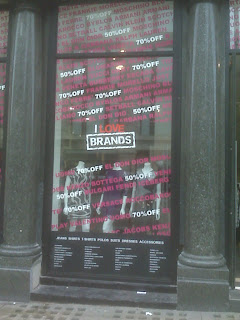
I love brands… Yes, I do; but, it would seem that, especially over the span of the latest economic crisis, the “consumer” has become decidedly less enchanted with brands, per se. On the one hand, the crisis has accentuated the need for consumers (and companies) to cut back on expenses and be more budget conscious — helped by the transparency offered via price comparison sites. On the other hand, in a world of hyper-consumerism and a return to good sense and more reasonable values, consumers are also looking for greater authenticity and meaning in their purchases and their relationship with the goods and services they consume.
A study by the BBDO ad agency in May 2009, showed that 48% of people in France seek to consume more intelligently, to avoid unnecessary waste and sophistication. Staying with France, a TNS Sofres study released this summer said that 7 of every 10 French people believe that consumer product brands attempt to “deceive” them. Eight out of ten consumers in France do not trust consumer brands. But this is not unique to France–far from it. To cite just Australia, a similar study showed that the Australian consumer doesn’t feel respected by the brands. According to the TNS survey in Australia, 58% of the Australian public feels indifferent to brands. The major brands have seen the pleasure associated with the purchase act drop (from 2007 to 2008) by 7 points to 60% and the confidence barometer fall 6 points to 59%. (Source Chef d’Entreprises). Presumably, if I dug around the stats in the US, UK and other western countries, the same type of trend would be observable.
The net, net, (not to mention the ‘net) is that the consumer is no longer prepared to buy a brand blindly. The brand capital [aka equity] for brands which fail to ‘give back’ enough value and meaning are undoubtedly taking it on the chin and it will be difficult to catch back lost ground on the other side of the recession [RIP]. However, it may yet be too early to see the effects on the ‘losing’ brands in terms of sales since some portion of the failure may be masked by [overly] aggressive marketing; which would mean that looking at the net price per unit and brand profitability.
Maintaining the perceived value in the realised price is strategic to the long term survival of brands, in order to help them invest in R&D (and innovation in general), but also in the appropriate distribution channels, education and, even, in society and/or the community. A shop on Oxford Street (London), called I Love Brands, captured for me the essence of many brands today as far as the post-recession consumer is or will be concerned: I Love Brands [that have no meaning or values] Only at a Major Discount… The list of brands blaring out on this shop front window included Dior, Valentino, Bottega, Versace, Fendi…. Proof also that it is important to manage carefully one’s distribution outlet(s) to have partners in BUILDING your brands with you.

And the bottom of the barrell, although I enjoyed the (certainly unintended) play on words, the shop had a nice little rack on the right side of the doorway on the pavement, from £20, 70% OFF:
Closing Down Sale Mens Shoes Upstairs

So, what are brands to do? To start with, they need to make sure that the higher prices are justified, not just by innovation and great product performance, but superior customer service, a sense of meaning, greater values, and a healthy dose of customer listening and interactivity. But, above all, they need to regain their customer’s trust and confidence, something which seems to be cruelly missing for so many brands.
In terms of the interactive/emotional connection, I have a few good examples (credit: Branchannel) of brands investing in getting people together, to foster the community/good feeling:
- T-Mobile in England brought together 13,500 people in a flash mob, HEY JUDE singalong.
- Apple and Nike banding together for the HUMAN RACE (24 October 2009)
- IBM did a crowdsourcing event to inspire change under the name of Smarter Planet University Jam, whereby some 2000 people from 40 countries joined together.











I own a private sales club. So can only agree 🙂